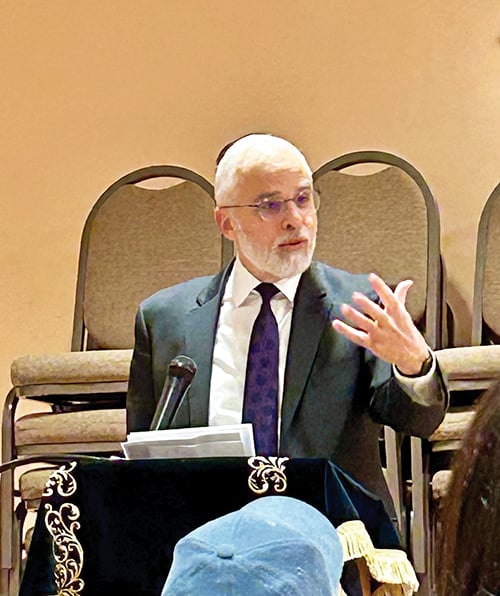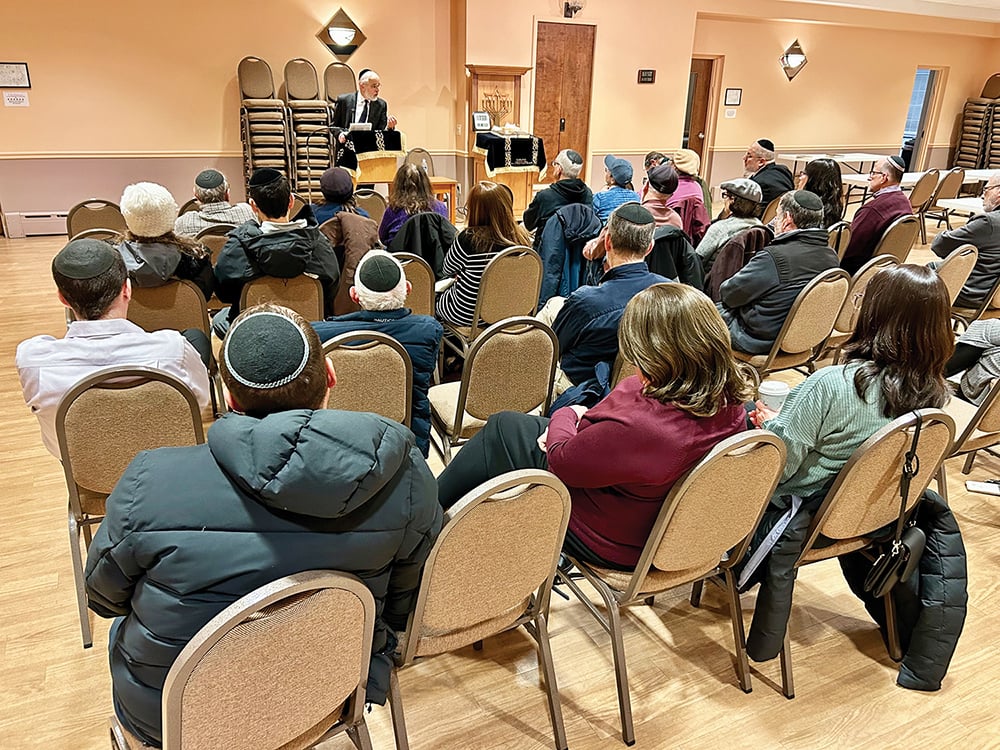
Speaking to dozens of community members who came out on one of the coldest nights of the season thus far, OU’s Executive Vice President Rabbi Moshe Hauer asserted that the challenges facing Jews in the current era bear a striking similarity to those the Jews overcame in the historic struggle that resulted in Chanukah.
In a talk on Sunday. Dec. 22. at Cong. Ohav Emeth in Highland Park entitled “Then and Now: The War for Truth,” Hauer noted that the Al HaNissim prayer hints at such a connection, in the words “Bayamim hahaim b’zeman hazeh, in those times and in our times.” He said that “What was done then, we must continue to do.”
As an illustration, Hauer spoke about when he first heard of the initial reaction of Hadas Loewenstern, the widow of IDF Master Sgt. Rabbi Elisha Loewenstern, to the news of her husband’s passing. He thought: “That is amazing and she sounds like she’s out of her mind.” He could not fathom how she exhibited such strength and firm belief in Hashem in the face of such a loss. When he visited her at her home in Horesh in January, he found that she wasn’t at all crazy but is very grounded and committed to staying strong in her faith.
Hauer pointed to the verse in Zechariah (4:6) that states, “Lo b’chayil, lo b’koach, ki im b’ruchi, Not by strength, not by valor, but with my spirit.” He said that “the Jewish people don’t triumph by the number of soldiers or the strength of their forces, but with the spirit of Hashem.”

Looking again at the Al HaNissim, Hauer noted the verse that states that “You gave the strong into the hands of the weak, the many into the hands of the few, and the impure into the hands of the pure.” He said that part of the Chanukah story, and our contemporary conflicts, are a war to be able to tell the story of our faith, to shine the light of the Jewish people and the Jewish struggle for righteousness.
Looking more closely at the historical setting of the Chanukah miracles, Hauer pointed to the differences between that era and others. The phenomenon of Hellenized Jews was a real danger, one the Jews didn’t face in Egypt or other exiles until then; he termed it “An American Story,” for its echo in our era. The Greeks were considered a people of books and wisdom, so it seemed that they and the Jews had a common language. The Hellenization appeared to be overtaking the Jewish community until Matisyahu and the Maccabees reversed the trend. They fought because they understood that “the Greeks had great wisdom but were kind of low on morality,” said Rabbi Hauer, while in the Torah, wisdom and morality must be inseparable.
Hauer noted that in 2024, the separation of wisdom and morality is a big issue and the larger Western culture speaks of goodness, justice, kindness and charity, and turns those words against us. As an example, he shared an anecdote of a meeting he had with a U.S. Department of Justice staff person who had authored an official communication about campus protests against Israel that Hauer found troubling. Hauer mentioned that at that point, it was already well-known that the Iranian government was funding and instigating these protests to undermine the stability of the United States.
The DOJ staff person said to Hauer, in confidence, that on Oct. 8 he was visiting a college campus and saw both a pro-Israel rally and an anti-Israel/pro-Hamas rally and, “the difference between the two groups was very visible to me.” He couldn’t say more and the document he drafted reflected an ambivalence that did not take into account what he saw.
The DOJ staffer also shared that, as a Native American, he had attended a gathering of indigenous peoples where someone stood up and said: “The world is characterizing the Israelis as colonizers. But the Jews in Israel are the opposite of colonizers. They were separated from their land
centuries ago but they didn’t let go; they dreamt, prayed and hoped for return, and then they did. They should be an inspiration for our community.”
The task of Klal Yisrael, said Hauer, is to continue to be the pure and righteous ones, to fight with valor and strength while also embracing tzedaka and mishpat.
Rabbi Hauer shared the insights of the Maharatz Chajes, Rabbi Tzvi Hersh Chajes, a rav in the first half of the 19th century, who suggested that the Jews have a presence beyond their borders because they have something to teach the world and an imperative to help the world. Hauer said that the Jewish people must not forfeit the battle, though it is tough, but they must keep up the struggle because truth will prevail.
Hauer ended his talk with insights from the Ponovitcher Rav and Rav Kook. The Ponovitcher Rav asked: “Why do we thank Hashem ‘for the wars’ in Al HaNissim?” He answered that Jews do so because many Jews at that time saw no need to fight the Hellenization. Therefore, Jews thank Hashem that Jews took up this fight and fought to be taho, holy.
Rav Kook noted that the Jewish people’s halachic obligation is to light the menorah in the window to illuminate the world. But in a time of danger, the menorah can be lit inside, on a table. Jews do this because first and foremost, because of the need to ensure that the Jewish family is strong in its values and rallies around the lights.
Speaking to The Jewish Link after the event, Steve Deutsch of Highland Park stated: “It was very insightful that Rabbi Hauer related how Purim, Pesach and Chanukah are all similar. On Purim we celebrate the miracle by coming together to recall the miracle and on Pesach we get together and invite people to come in to witness our seder, to relive the exodus. And at Chanukah we light a menorah in the window to publicize the holiday. Rabbi Hauer’s perspective was very thought-provoking.”
Harry Glazer is the Middlesex Community Editor of The Jewish Link. He can be reached at harryglazer615@gmail.com and he welcomes reader feedback.









